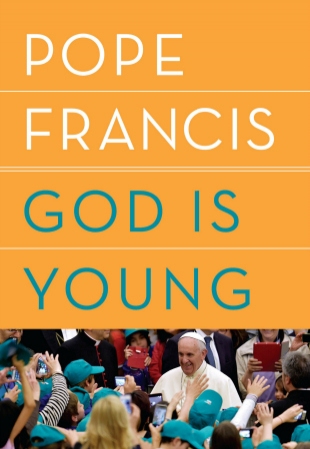"I see someone who is searching for his own path, who wants to fly on his two feet, who faces the world and looks out at the horizon with eyes full of the future, full of hope as well as illusions. A young person stands on two feet as adults do, but unlike the adults whose feet are parallel, he always has one foot forward, ready to set out, to spring ahead. Always racing onward. To talk about young people is to talk about promise and to talk about joy. Young people have so much strength; they are able to look ahead with hope. A young person is a promise of life that implies a certain degree of tenacity; he is foolish enough to delude himself and resilient enough to recover from that delusion.
"Then, too, we can't talk about young people without touching on the theme of adolescence, because we must never underestimate that phase of life, which is probably the most difficult and the most important in a person's years. Adolescence marks the first true conscious contact with identity and represents a transitional phase not only in the child's life, but the life of the entire family. It is an intermediate phase, like a bridge that leads to the other side. And for this reason adolescents are neither here nor there, they are on their way, on the road, on the move. They are not children — nor do they want to be treated as such — but they are not adults, either. Yet they want to be treated as adults, especially when it comes to privileges. So we can probably say that adolescence is a state of inevitable tension, an introspective tension of the young. At the same time it is so intense that it is able to shake up the entire family, which is precisely what makes it so important. It is the young man's and the young woman's first revolution, the first life transformation, the transformation that changes one so much that it often upends friendships, loves, daily life as well. When we are adolescents the word 'tomorrow' cannot be used with certainty. Even as adults we should be more cautious in uttering the word 'tomorrow,' particularly these days, but never are we as aware of the moment and the importance it holds than as adolescents. The moment, for the adolescent, is a world that can overturn his whole life. He thinks much more about the present during adolescence than during all the rest of his existence. Adolescents seek confrontation, they ask questions, they challenge everything, they look for answers. I can't stress enough how important it is to question everything. Adolescents are eager to learn, eager to fend for themselves and become independent. It is during this time that adults must be more understanding than ever and try to demonstrate the proper way through their actions, rather than insisting on teaching with words alone.
"Young people go through different, even abrupt, states of mind, and their families with them. It is a phase that has its risks, undoubtedly, but above all it is a time of growth, for them and for their entire family.
"Adolescence is not a pathology, and we cannot treat it as if it were. A child who experiences his adolescence positively — however difficult it may be for the parents — it is a child with a future, with hope. I often worry about the current tendency to 'medicate' our children at an early age. It seems we want to solve all our children's problems with medication, or by controlling their lives to 'make the most of time,' and so our children's agendas become busier than that of a high-level executive. I stress again: Adolescence is not a pathology that we must combat. It's part of normal, natural growth in our children's lives.
"Where there is life there is movement, where there is movement there are changes, exploration, uncertainties, there is hope, there is joy, as well as anguish and misery."
